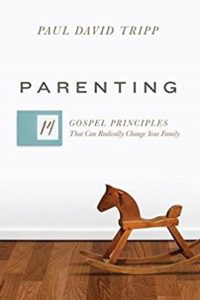Parenting by Paul David Tripp
 I believe the gospel; sometimes it just doesn’t show in my parenting.
I believe the gospel; sometimes it just doesn’t show in my parenting.
You know what I mean, don’t you?
Some days, in my sorority house of 6 girls ages 11-18, I can get a little cranky and controlling. I just want knickknacks picked up, general obedience, a little peace and quiet, and some manners. Those days are more about me than about the gospel.
Paul David Tripp helps to bridge the gap. In his 2016 book Parenting: 14 Gospel Principles That Can Radically Change Your Family, he rubs the gospel into the essence of parenting.
If you’ve been a Christian for a while, this book may feel intuitive, articulating previously murky ideas. Those ‘Aha!’ moments were not uncommon as I read it.
For Tripp the essence of parenting is Jesus’ command in the Great Commission: Make Disciples. Only we can’t! But God can. In parenting God invites us to participate in his rescue mission of the children that he has given us.
The heart of our children’s disobedience is sin—not just an act, but a condition. They’re lost. They sin because they’re sinners. Their greatest danger isn’t surrounding culture or outward temptation. What’s inside them is far more dangerous.
Oh and here’s the thing—they can be happy, obedient, and successful with good grades and bright futures, and still be lost.
It’s a problem of the heart, rooted in worship, which spills out into their character. That condition leads to two lies: autonomy and self-sufficiency. They want to be God, to be their own authority.
So God sends them you.
But the problem is we’re just like our children!
Paradoxically, that’s good news. The best person to lead your child to the Rescuer is one who has himself been rescued. Then you’re not parenting out of autonomy, but out of submitting to God’s authority, not out of self-sufficiency, but out of inadequacy.
You have to be able to confess your sins and recognize your own idolatry in order to lead your children to the Savior. “If rules and regulations had the power to change the heart and life of your child, rescuing your child from himself and giving him a heart of submission and faith, Jesus would have never needed to come.” (49)
As a result, parenting is transformed from a paradigm of ownership to one of representation. We don’t own our children (and so building our identity and reputation on their success will always fall short); we are simply ambassadors ushering them into the presence of the king.
And here’s the good news in parenting—God is always parenting us while we are parenting our kids. We are his children and he is rescuing us, and as he does, he involves us in an on-going and unending conversation around the gospel. Parenting is “unfinished people (we parents) being used of God as agents of transformation in the lives of unfinished people.” (92)
In case you were wondering, here are Tripp’s 14 Gospel Principles:
- Calling: Nothing is more important in our life than being one of God’s tools to form a human soul.
- Grace: God never calls you to a task without giving you what you need to do it. He never sends you without going with you.
- Law: Your children need God’s law, but you cannot ask the law to do what only grace can accomplish.
- Inability: Recognizing what you are unable to do is essential to good parenting.
- Identity: If you are not resting as a parent in your identity in Christ, you will look for identity in your children.
- Process: You must be committed as a parent to long-view parenting because change is a process and not an event.
- Lost: As a parent you’re not dealing just with bad behavior, but a condition that causes bad behavior.
- Authority: One of the foundational heart issues in the life of every child is authority. Teaching and modeling the protective beauty of authority is one of the foundations of good parenting.
- Foolishness: The foolishness inside your children is more dangerous to them than the temptation outside of them. Only God’s grace has the power to rescue fools.
- Character: Not all of the wrong your children do is a direct rebellion to authority; much of the wrong is the result of a lack of character.
- False Gods: You are parenting a worshiper, so it’s important to remember that what rules in your child’s heart will control his behavior.
- Control: The goal of parenting is not control of behavior, but rather heart and life change.
- Rest: It is only rest in God’s presence and grace that will make you a joyful and patient parent.
- Mercy: No parent gives mercy than the one who is convinced that he desperately needs it himself.
